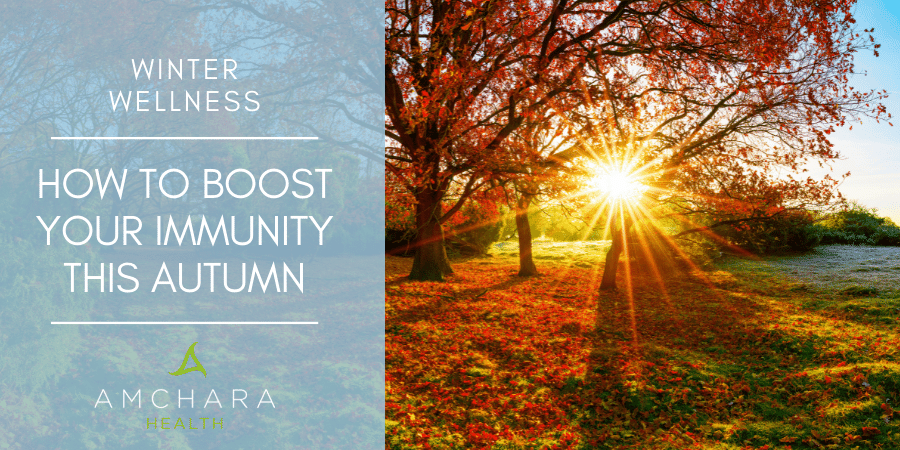Topics Covered in this article:
In the run-up to winter, typically more time is spent indoors and as the weather gets increasingly colder, the environment for germs to spread becomes optimal. As a result, many people often come down with various strains of colds and flu at this time, making it even more important to boost your immune system and overall health in order to be able to fight off infections as efficiently as possible.
In the modern internet world there is an overwhelming amount of information; it can be hard for you to find health advice that you can trust, particularly as the main media channels are typically dominated with a single, orthodox narrative.
We always take an evidence-based approach, orientated towards a holistic and Personalised Health approach, and aim to provide you with actionable knowledge and tips to help you on your journey to optimal health.
In this article, we look at various ways to boost your health over the autumn months to avoid being forced to stay at home sick.
Herbal Adaptogens
Herbal adaptogens are certain botanical compounds that can boost the body’s immune system by strengthening the body, combatting fatigue, fighting the body’s response to stress, and prompting mental balance. Taking these as supplements can be an effective way of giving your immune system a boost over the run-up to winter, and indeed all year round. Although they can have a significant positive impact on your health, it is important to remember that some people may experience side effects; and if you are pregnant, breastfeeding or have any chronic health conditions, always consult your doctor before taking any supplements.
- Ashwagandha
Ashwaganhda is a small, evergreen shrub originating in India, the roots and berries of which can be used to make a medicine which has, in clinical studies, been proven to be an effective adaptogen, shown to support a healthy immune response, reduce inflammation and increase energy levels, which often begin to sap as the days get shorter as winter approaches.
- Acorus calamus
Acorus calamus is another powerful adaptogen exerting many different pharmacological effects including antibacterial and antiulcerative properties. One study found that feelings of anxiety, stress, and depression were reduced in people who took 500mg of acorus calamus twice a day, making this another good supplement to take over the colder months. It can also help to lower free-radical induced oxidative stress, and so has a protective effect on the immune system.
- Goji berry
This adaptogenic berry containing B vitamins, essential amino acids and important trace minerals, can boost energy levels and mental and physical performance, whilst also promoting calm, wellbeing and improving sleep. Contributing to healthy skin and eyes, these powerful berries are also thought to provide support to the immune system and protect against flu, which becomes significantly more prevalent over winter.
- Reishi mushroom
Sometimes described as the ‘mushroom of immortality’ and usually found in dried, powdered form, the Asian reishi mushroom is a versatile adaptogen that can be added to savoury dishes, although be aware it has a very bitter taste. These mushrooms contain beta-glucans, which help to modulate and improve the function of the immune system. As adaptogens, they are thought to help the body better handle stress, as well as improving mood, and reducing inflammation.
Exercise
Exercising in the autumn months is another great way of boosting your immune system, as well as your mental health. Exercise is known to release endorphins, chemical messengers which have been scientifically shown to combat depression and boost your overall mood. Furthermore, endorphins can influence several immune functions such as synthesis of antibodies, and lymphocyte proliferation, making exercise an effective way of fighting off germs in the colder weather.
Exercise doesn’t have to be a chore, however. The autumn offers lots of outdoor activities which can be equally beneficial to the more traditional workouts and exercises, from apple picking, to simple garden tasks such as raking leaves, and outdoor hiking or running. Activities like these can up your overall activity levels throughout the day and offer short bursts of intensity, helping to keep you energised, while also ensuring you gain enough fresh air to leave you feeling invigorated and boost your body’s immune system.
For example, apple picking requires overhead stretching, as well as twists and forward bends, all of which are good for maintaining mobility, with the added bonus of a healthy cache of apples at the end of it, which in themselves are rich in the antioxidant quercetin, beneficial for regulating your immune system and reducing inflammation.
Also, carrying out simple garden tasks, either in your own garden or a community one, can help to significantly boost your mood over autumn by making you feel more peaceful and content, while focusing your mind on the task at hand and helping to distract from any negative thoughts. Just spending time tending to a garden has been shown to have many health benefits for many people. Activities such as weeding, digging and raking are also good forms of exercise and additionally contribute to a reduction in anxiety and depression.
Sleep
The decrease in the amount of daylight in the autumn influences and disrupts the body’s sleep-wake cycle – the circadian rhythm. Light also affects the release of melatonin, a hormone that regulates the circadian rhythm and makes you feel tired. Less light exposure means more melatonin, which can therefore lead to you becoming more sluggish or drowsy than usual. As a result of this, it is even more important during the autumn to ensure you are getting enough, good-quality sleep to combat the shortening daylight hours.
A lack of sleep has also been shown to impair immune function, which in the winter can leave you more vulnerable to bacteria and viruses which are significantly more prevalent. In one study, participants who slept fewer than 5 hours per night were 4.5 times more likely to develop a cold compared to those who slept for more than 7 hours.
In order to improve your sleep during this time, much advice and multiple studies suggest getting into a daily routine, by which you can wake up, incorporate winding down time, and go to bed all at a similar time each day. It is important to remember your sleep routine actually starts before you get into bed, so allocating dedicated time before bed to switching off devices and engaging in relaxing activities such as taking a warm bath or reading a book, can significantly help to improve both the amount and quality of your sleep.
Takeaway
Although autumn can typically be a time in which your overall health begins to lapse slightly due to more prevalent germs and weaker immune systems, as well as a rise in depression linked to the changing weather and sunlight levels, taking simple steps to ensure your health is your primary focus over these months can help to combat this and leave you feeling overall much happier and healthier as we move into winter.
If you want to boost your health and immune system even more over the coming months, why not come to Amchara for a relaxing detox health retreat in our tranquil surroundings? With expert advice on hand from our experienced practitioners, you can benefit from personalised health advice, tailored to your needs and goals to help you maximise your health gains.
Juicing and fasting may be recommended, according to your personal situation and unique health needs. You will be immersed in a supportive and nurturing environment that enables you to switch off, relax and kickstart your health journey, including physical activities and empowering, educational talks.
Or why not try Amchara Juicery – cold-pressed, nutritious juices delivered to your door to help you boost your health, naturally. Created by Amchara’s expert in-house health team, you can enjoy a range of fresh, organic juice cleanses (and super soups) at home.
Articles you might be interested in:
- 6 ways to improve your mental health through detoxing
- 10 herbal adaptogens to support your immune system
- How To Improve Your Immune System Naturally
- Top 7 immune-boosting herbs and spices




